 April 01, 2022 12:36 PM UTC
April 01, 2022 12:36 PM UTC
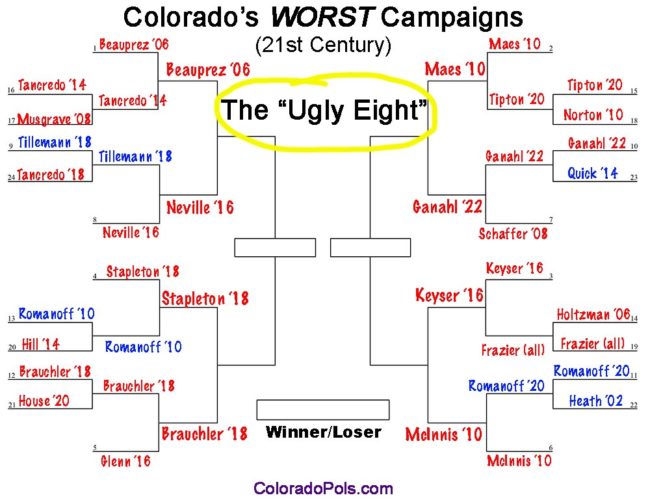
Following two rounds of voting (amongst ourselves), we’re advancing the bracket of “Colorado’s WORST Campaigns” to the “Ugly Eight.”
Click here to catch up, or continue below to read our breakdown of the “Ugly Eight”…
Sorry, Tom, but this just isn’t a fair fight.
As we’ve said from the outset of this bracket, it’s going to be really, really tough to unseat Bob Beauprez’s 2006 gubernatorial campaign as the worst in Colorado this century. There are a number of factors that put “Both Ways Bob” at the top of this list. First, the context is important…
When Beauprez announced his campaign for Governor in 2005, he was a two-term Congressman from CO-07, at the time a new district encompassing much of Jefferson County and Aurora. This afforded him great name ID within the most electorally-important part of the state (the Denver Metro area). Beauprez was also serving on the powerful House Ways and Means Committee, which introduced him to a lot of influential donors and powerful players who could assist him in a statewide campaign. On paper, Beauprez was an ideal candidate who scared away the top potential Democratic challengers at the time; Denver Mayor John Hickenlooper, House Speaker Andrew Romanoff, and State Sen. Joan Fitz-Gerald all declined to run for Governor. Businessman Rutt Bridges was also in the race, briefly, before dropping out in August 2005. Former Denver District Attorney Bill Ritter eventually became the Democratic nominee for Governor in part because there really was nobody else (this is no slight to Ritter – it’s just the way things turned out).
The point here is that Beauprez was expected to be the frontrunner in 2006, and he was treated as such. By the time Marc Holtzman failed to make the Republican Primary ballot because of a problem with his petition signatures, it looked like everything was lining up perfectly for Beauprez. All he had to do was run a competent campaign.
He did not. Beauprez made mistake after mistake on the campaign trail, punctuated by the release of what is still the undisputed worst TV ad in recent memory; that spot opened with Beauprez talking to the camera while standing next to a horse’s ass. The point was supposed to be that there is a lot of crap in politics, but whatever he said after this image proved irrelevant:
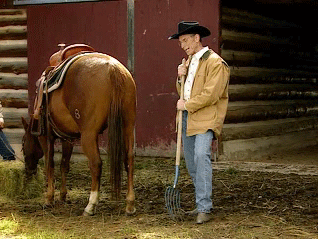
Beauprez didn’t just lose to Ritter – he was CRUSHED by a final margin of 57-40. It’s important to remember at the time that Democrats in Colorado were just starting to emerge from years of losing to Republicans, which made Ritter’s 17-point margin of victory so unbelievable. Sure, Democrat Ken Salazar narrowly defeated Republican Pete Coors in the 2004 Senate race, but Republicans controlled every other statewide office and made up the majority of Colorado’s Congressional delegation. Prior to the 2004 election, Republicans held the trifecta in state government with both chambers of the legislature under GOP control; when Democrats gained the majority in the State House in 2004, it was for the first time in more than a decade.
So, yeah, Bob Beauprez’s 2006 campaign for Governor moves on to the ‘Ugly Eight.’

We discussed Tillemann’s campaign in our previous entry, so we’ll focus more on Neville here. In 2015, Neville was the de facto leader of the GOP caucus in the State Senate, and his son, Pat, was about to become the House Minority Leader. Tim Neville’s entry into the U.S. Senate race thus made a lot of sense. He was racking up the endorsements heading into caucus season in late February 2016 and was perceived to be such a favorite within the GOP base that virtually every other candidate sought access to the June Primary ballot via the petition process (which is a story all by itself). The one red flag on Neville’s campaign was that he didn’t seem to be raising a lot of money, but that was somewhat excused because it was generally believed that he wouldn’t have to expend many resources to get his name on the ballot.
Neville looked like a virtual lock to win top-line at the state assembly on April 9, 2016, with only little-known challengers Darryl Glenn, Peg Littleton, and Jerry Natividad competing for the support of the GOP base. And then he just…bombed.
Glenn delivered a rousing speech at the assembly, to be sure, but Neville’s delegate-herding operation was so completely inept that he ended up getting out-voted by a nearly 5-to-1 margin among a base that he was supposed to have locked up. Neville didn’t just fail to make the top-line at assembly – he couldn’t generate enough support to even reach the 30% threshold required to access the Primary Ballot. Just like that, his U.S. Senate campaign was over.
Two years later, Neville was ousted from the State Senate in a 14-point drubbing at the hands of Democrat Tammy Story.
Neville’s 2016 campaign advances in our bracket because, unlike Tillemann, he failed miserably despite having many obvious advantages. Tillemann got hammered in a Democratic Primary, but at least his name actually appeared on the ballot.
You can read our rundown of Romanoff’s troubled campaign here. For all of its faults, Romanoff’s campaign doesn’t compare to Walker Stapleton’s 2018 gubernatorial mess.
Stapleton served two terms as State Treasurer (sort of), and it was always an open secret that his ultimate goal was Governor. A few other Republicans attempted to win the GOP Primary, but Stapleton had long been anointed by GOP power brokers. Their faith in his campaign was not rewarded.
There was no singular moment that defined Stapleton’s 2018 campaign. It can perhaps be summed up best in one image:
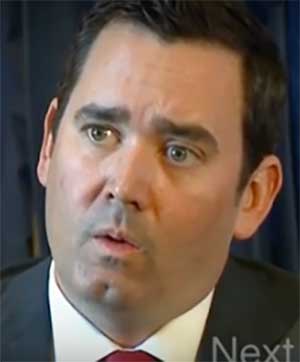
Stapleton was a caricature of himself, a bumbling goof with no discernible message who was impossible to take seriously. His campaign was so bad that it nearly forgot to select a Lieutenant Governor running mate after winning the Republican Primary.
By the time the fall rolled around, it was obvious that Democrat Jared Polis was going to breeze by Stapleton in November. Stapleton was getting plenty of press coverage, but all of it was terrible. At one point Stapleton basically ran away whenever a reporter was spotted nearby.
Polis eventually put Stapleton out of his misery with an 11-point victory. Losing the 2018 race for Governor might not have been the worst thing for Stapleton personally, but it’s enough to advance him in our bracket.
Every tournament bracket needs a #12 vs. #5 seed upset, and this is ours. Glenn might have been among the worst statewide candidates in Colorado history in a General Election, but he managed to get through a Republican Primary before things went south and he started doing things like refusing to talk to the media.
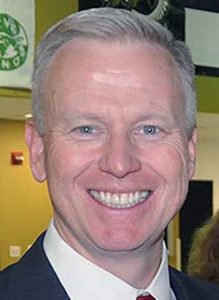
Brauchler’s 2018 gubernatorial campaign advances here because it was so completely terrible that the candidate ended up changing races altogether (eventually losing the 2018 Attorney General race to Democrat Phil Weiser). Brauchler got some good press when he launched his gubernatorial bid in April 2017; things got worse in every subsequent week for “The Magnificent Putz” as his rhetoric fell apart. The low point came in October 2017, when Brauchler’s small cadre of supporters were claiming that his campaign had all the “momentum” in the race following a third quarter fundraising report that didn’t even crack six digits. Brauchler’s campaign manager, Ryan Lynch, bailed soon afterward, laughably refusing to comment citing a “nondisclosure agreement” with the campaign.
When Tom Tancredo subsequently jumped into the race for Governor (again), the bell hath tolled for Brauchler. He was officially out of the race for Governor less than a month later when then-Attorney General Cynthia Coffman announced that she was running for Governor instead of seeking re-election as AG – giving Brauchler a place to land his sinking ship. Brauchler’s official announcement included a statement that was appropriately ridiculous:
“My decision to run for office has always been about my commitment to serving Colorado far more than it has been about the title of the elected position. That commitment remains just as strong as we make this important change.”
This was a long-winded way of saying, “I just want to be a candidate for SOMETHING in 2018,” and was the cherry on top of his turd cake. Brauchler was such a bad candidate in 2018 that he failed in two separate statewide races in the same cycle. That’s the kind of performance that gets you to the next round in this bracket.
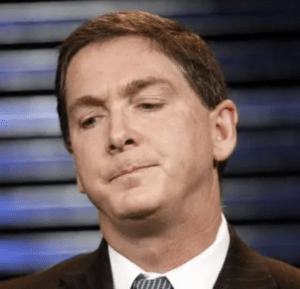
This was a tough call, but ultimately the “victory” goes to Dan Maes, whose campaign was so terrible that he nearly cost the Republican Party its “major party status” in 2010 – the “Tea Party” wave year that should have been a perfect opportunity for the GOP.
Maes won the Republican Primary for Governor in 2010, capturing the nomination after former frontrunner Scott McInnis flamed out in an infamous plagiarism scandal. Colorado Republican leaders were (rightly) not impressed by Maes, so they (wrongly) convinced Tom Tancredo to run for Governor as a candidate for the American Constitution Party (ACP). State Republican Party Chair Dick Wadhams even issued a press release denouncing his own party’s gubernatorial nominee. Seriously. Read that sentence again.
Democrat John Hickenlooper went on to win the race for Governor with 51% of the vote. Tancredo finished with 36.4%, and Maes limped across the finish line with 11%. Had Maes been unable to reach 10% of the vote, the Colorado Republican Party would have been relegated to “minor party” status in 2012 (as it was, the ACP did end up gaining “major party” status for one cycle) .
For nearly crippling the entire Colorado Republican Party, the Dan Maes for Governor campaign in 2010 moves on to our “Ugly Eight.”
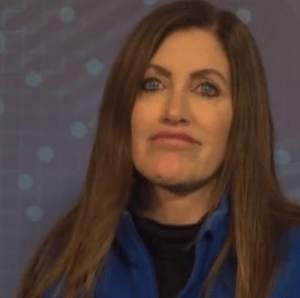 Former Congressman Bob Schaffer was a walking, talking scandal machine in 2008, in part because of his ties to disgraced lobbyist Jack Abramoff. Schaffer was singularly responsible for an enduring geography lesson for Coloradans, most of whom had likely never even heard of the Mariana Islands before October 2008.
Former Congressman Bob Schaffer was a walking, talking scandal machine in 2008, in part because of his ties to disgraced lobbyist Jack Abramoff. Schaffer was singularly responsible for an enduring geography lesson for Coloradans, most of whom had likely never even heard of the Mariana Islands before October 2008.
Schaffer’s campaign was equally inept; its first General Election television ad memorably featured a picture of Mount McKinley in Alaska as a stand-in for Colorado’s Pikes Peak, and it later touted a shady endorsement from an organization accused of profiting off of the Iraq War. Schaffer’s campaign was so awful that it underperformed polling expectations significantly. Schaffer started the 2008 campaign by polling close with Democrat Mark Udall; it ended by losing to Udall by more than 10 points.
We’ve written a lot about Ganahl’s terrible 2022 campaign, which would probably even improve under the leadership of an actual dog. It’s still early in the process, but Ganahl’s campaign advances in our bracket because of its immense potential to be an historic failure.
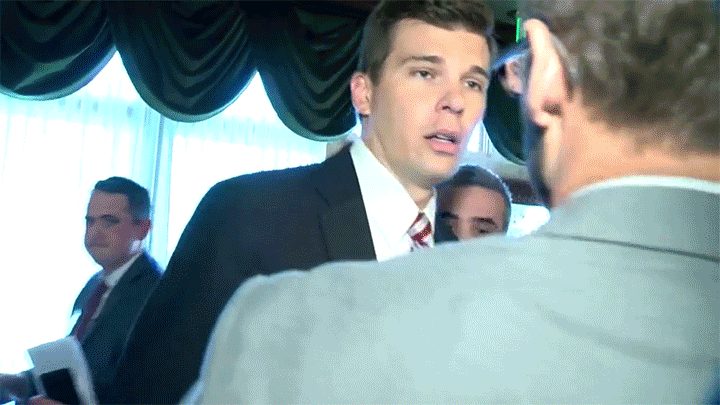
We detailed Ryan Frazier’s repeated failures in our last bracket update. Even though Frazier had multiple faceplants, Republican Jon Keyser’s 2016 U.S. Senate campaign is tough to dislodge because it was so memorably disastrous. Click here for a good recap of what made Keyser’s campaign so awful.
Keyser seemed like a potentially-strong candidate when he launched his U.S. Senate bid in January 2016. He was the darling of the National Republican Senatorial Committee (NRSC) as a young, attractive state lawmaker with a made-for-TV background as a Bronze Star recipient in the Air Force and a veteran of wars in Iraq and Afghanistan. Five months later, Keyser’s campaign was deader than one of the “voters” who allegedly “signed” his petition for ballot access. Keyser’s ballot fraud problems earned him unfathomable amounts of terrible press coverage – he was literally a top story in most Colorado news outlets for nearly three consecutive weeks at one point – which kicked off with an absolutely EPIC on-camera meltdown with Marshall Zelinger of Denver7.
Keyser tried to ride out the bad press to no avail. By the time the June Primary came around, he had retreated to his own living room rather than coming out to thank however many volunteers remained.
Keyser’s petition-gathering scandal did produce one victory, however: It earned Zelinger a prestigious Walter Cronkite Award for Excellence in Television Political Journalism.
 You can read more about Romanoff’s 2020 campaign in our last update. To understand why Scott McInnis is on this list, and why his campaign is advancing to the next round, read what we wrote above about Dan Maes and consider this…
You can read more about Romanoff’s 2020 campaign in our last update. To understand why Scott McInnis is on this list, and why his campaign is advancing to the next round, read what we wrote above about Dan Maes and consider this…
Scott McInnis LOST to Dan Maes.
That’s about all we need to say about that.
Subscribe to our monthly newsletter to stay in the loop with regular updates!
Comments